Our Curriculum
Curriculum Intent
At Rudston Primary we are fully committed to providing a relevant, broad and balanced curriculum that meets the needs of all children and supports everyone to learn and remember more.
Through our curriculum we aim to encourage and develop inquisitive thinkers and learners, with high aspirations, who know how to make a positive contribution to their community and the wider society. The curriculum design ensures that challenge, enjoyment, respect, responsibility and resilience, as well as physical development, well-being and mental health are key elements that support the development of the whole child and promote a positive attitude to learning. Our curriculum enables us to build strong relationships, celebrate diversity, encourage respect and build a sense of community. It provides and acknowledges success for all children, in all aspects of their development and it recognises, encourages and celebrates all types of talent. Children leave Rudston Primary School with a sense of belonging and are proud that they have developed the confidence and skills needed to be learners for life.
We use on-going formative assessment, low stakes quizzing and opportunities to practise to check and assess pupil grasp of this key curriculum content – ensuring transferral to long-term memory.
The aims of our school curriculum are:
- to enable all children to learn, and develop their skills, to the best of their ability;
- to promote a positive attitude towards learning, so that children enjoy coming to school, and acquire a solid basis for lifelong learning;
- to teach children the basic skills of literacy, numeracy and information and communication technology;
- to enable children to be creative and to develop their own thinking;
- to teach children about the developing world, including how their environment and society have changed over time;
- to help children understand Britain’s cultural heritage;
- to appreciate and value the contribution made by all ethnic groups in our multi-cultural society;
- to enable children to be positive citizens;
- to fulfil all the requirements of the National Curriculum and the Locally Agreed Syllabus for Religious Education;
- to teach children to have an awareness of their own spiritual development, and to distinguish right from wrong;
- to help children understand the importance of truth and fairness, so that they grow up committed to equal opportunities for all;
- to enable children to have respect for themselves and high self-esteem, and to live and work cooperatively with others;
- Communication Friendly Spaces
- Global Diversity
- Sustainability
- Young Enterprise
As a staff we feel that these four areas will help us to develop our children further and prepare them for their future.
Curriculum Implementation
Our curriculum is thematic and allows the children to explore different subject areas via exciting topic themes. The themes are relevant and stimulating and allow the children to pursue their own ideas, make progress through the requirements of the National Curriculum and ensure the children develop a broad set of transferable skills.
Our curriculum is motivating, engaging and taught through Learning Challenge Curriculum themes with a strong emphasis on developing English. Visits and visitors are used to help deliver the curriculum in an exciting and stimulating way. Where areas of learning do not fit in to our themes we teach them as high quality stand-alone units.
“. . . the joy of true education: of reading for the sake of a wonderful book rather than for an exam; of following a subject because it is fascinating rather than because it is on the syllabus; of watching a great teacher’s eyes light up for sheer love of the subject.” Professor Richard Dawkins
Curriculum Impact
We aim for all children to leave Rudston Primary School with the skills, knowledge and ability:
To appreciate and value the contribution made by different groups in our multicultural society
To be positive citizens
To understand the importance of truth and fairness, so that they grow up committed to equal opportunities for all
To have respect for themselves and high self-esteem, and to live and work co-operatively with others
To learn, and develop their skills, to the best of their ability;
To be creative and to develop their own thinking;
To understand the developing world, including how their environment and society have changed over time.

